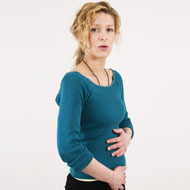- Baby care
- Baby Crying
- Baby Feeding
- Baby Growth
- Baby Language
- Baby Name
- Baby Potty Training
- Baby Safety
- Baby Shower
- Baby Sleep
- Baby Teething
- Bathing a Baby
- Early Pregnancy Signs
- Late Pregnancy
- Miscarriage
- Molar Pregnancy
- Post Pregnancy
- Postpartum Depression
- Pre Pregnancy
- pregnancy care
- Pregnancy Conditions
- Pregnancy Diet
- Pregnancy Due Date
- Pregnancy Exercise
- Pregnancy Heartburn
- Pregnancy Sex
- Pregnancy Sleep
- Pregnancy Stages
- Pregnancy Stretch Marks
- Pregnancy Style and Fashion
- Preschooler
- Second Pregnancy
- Teen Pregnancy
- Toddler Activities
- Toddler Behavior
- Toddler Discipline
- Toddler Food
- Toddler Illness and Injuries
- Toddler Speech
- Twin Pregnancy
Nausea After Miscarriage: Causes, Treatment

Most miscarriages occur within the first trimester. In fact, several miscarriages occur even before women realize that they are pregnant. After a miscarriage, a woman normally experiences several uncomfortable symptoms. Some of the more common side effects after miscarriage include severe pain, cramps in the abdomen and uterine contractions. Several women also experience dizziness, a headache and nausea after miscarriage.
What causes nausea after miscarriage?
The main reason for a woman to experience the feeling of nausea after miscarriage is the rapid change in the levels of hormones within the body. Moreover, the body goes through a lot of trauma during a miscarriage, which interferes with normal digestive procedure.
How long does nausea after miscarriage last?
Under normal circumstances, nausea after miscarriage should last for no more than a couple of days. However, in case a woman experiences long-lasting nausea after miscarriage, it could mean that something else is wrong. This could occur in case the woman has the flu or even because of dehydration. In some instances, women have been known to conceive again, within a few weeks after a miscarriage, which could also lead to extended feelings of nausea and dizziness after miscarriage. It is essential therefore for a woman to consult a doctor, in case she experiences nausea for a long time after having a miscarriage.
How to treat nausea after miscarriage?
There are various options that can help alleviate the feeling of nausea after miscarriage. One of the simplest ways to ease nausea is by taking an antacid. Alternately, there are other prescription and over the counter medicines also available. However, there are a few side effects that have been associated with medication, which is why most people now prefer using simple home remedies for relief from nausea. Some of the common nausea remedies include mint, ginger and lemon juice. At times, a diet change may be required to ease nausea, as it is best to consume foods that are light and do not have any strong flavors.
Apart from the physical side effects of a miscarriage, women also experience emotional problems, which interfere with their eating patterns and cause sickness. In such instances, women may need to undergo counseling to deal with the negative emotions, as well as nausea. In case the nausea does not abate even after using home remedies and medication, it may be necessary to undergo a test and determine the reasons.
- RSS Feeds -
- All posts
- All comments
- Miscarriage: Week 15 A miscarriage is basically defined as a spontaneous abortion which tends to e
- Miscarriage in Early Pregnancy Miscarriage is an expression used for pregnancy loss that occurs at anytime d
- Miscarriage And HCG Levels The HCG or Human chorionic gonadotropin is the hormone that is produ
- Miscarriage Signs At 7 Weeks A miscarriage is the spontaneous loss of a fetus, before the 20th week of pre